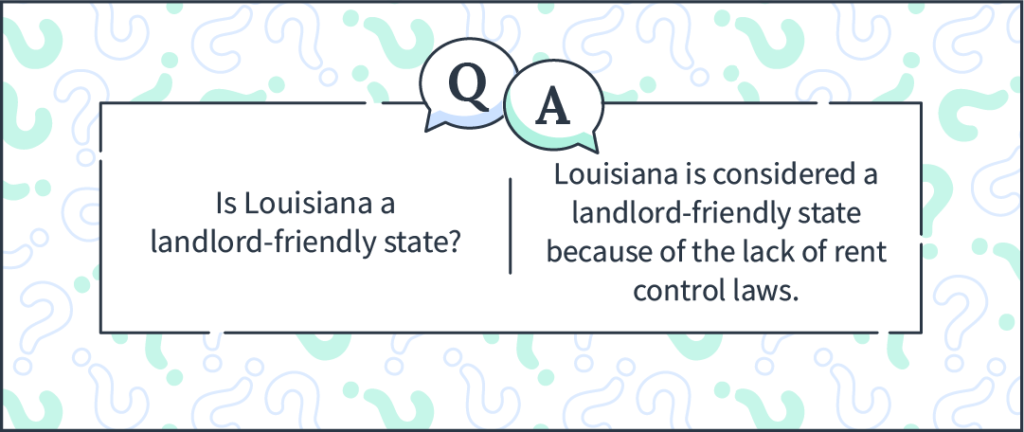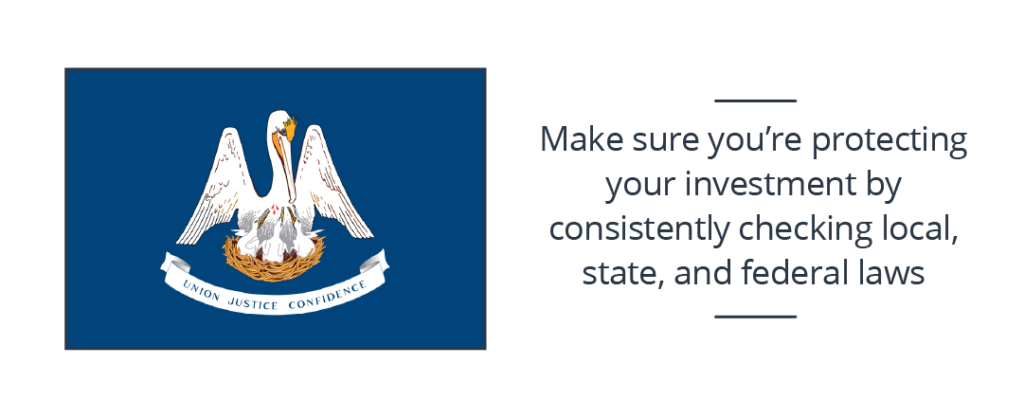Louisiana has an unemployment rate lower than the national average and made the list as one of the top ten places for young people. For these reasons, Louisiana is a hot spot for those looking to relocate. Louisiana also boasts a fair amount of reasons to be at the top of the list for those looking to invest in real estate.
Laws that impact the rental market, landlords, and tenants are constantly being decided in states. Make sure you know what’s on your ballot – find Louisiana voting information.

Louisiana Renters’ Rights and Landlord Responsibilities
- Must return security deposit within one month
- No notice required before raising rent
- No notice required before entering the property
- Required to make repairs in a reasonable amount of time
When it comes to Louisiana rental laws, there are a few specifics landlords need to know:
- Security Deposit – Louisiana law does not limit the amount a landlord may charge for the security deposit. Landlords must return the deposit within one month of the tenant moving out.
- Raising Rent – Landlords in Louisiana may increase the rent to any amount with no notice or justification.
- Notice of Entry – Louisiana does not require any notice before entering the unit or property.
- Repairs – It is the landlord’s responsibility to keep the rental in safe and healthy living conditions. If the landlord fails to do so, the tenant may deliver a written notice of what needs to be repaired or replaced. The landlord must make the repairs within a reasonable timeframe, though the exact time is not specified by law.
- Rental Applications – Housing providers are required to disclose whether they consider criminal history prior to accepting a rental application fee.
- Overdue Rent – If a tenant fails to pay rent on time, the landlord must give them a notice and five days to pay. If the tenant fails to pay, the landlord may file for eviction.
- Terminating a Lease – If a tenant needs to terminate a year-to-year lease, they must give the landlord a 30-day notice.
- Tenant Responsibilities – Tenants are required to keep the property clean and not disturb neighbors.
Rental Application Fee
There are no additional rental application fee laws in Louisiana.
Criminal Background Check
Landlords must be prepared to show a detailed tenant screening policy and efforts towards non-discrimination. Tenants must have the opportunity to explain any circumstances that may show up on background checks.
Build a Louisian lease agreement in less than 15 minutes.
Louisiana Landlord-Tenant Law FAQ
Below are answers to some of the most commonly-asked questions when it comes to landlord-tenant laws in Louisiana:
Can You Withhold Rent in Louisiana?
The only case in which a tenant may withhold rent in Louisiana is under the repair and deduct statute. This takes effect if the landlord fails to make necessary repairs, then the tenant may pay for the repairs and deduct the cost from their next rent payment.
How Long Does it Take to Evict a Tenant in Louisiana?
Evicting a tenant in Louisiana typically takes anywhere from two to five weeks, depending on the reason for eviction.
Is Louisiana a Landlord-Friendly State?
Louisiana is considered a landlord-friendly state because of the lack of rent control laws.
What is the Eviction Process in Louisiana?
There are three reasons a landlord may file for eviction in Louisiana. The three reasons include failure to pay rent, violation of the lease agreement, and end of the lease term. Depending on the violation, the landlord must give the tenant notice and anywhere from five to 30 days to cure their violation.
If the tenant fails to cure or move out, then the landlord may file a complaint with the court, which costs $150 and an additional $225 if the judge serves a writ of possession. After the complaint is filed, it will be served to the tenant at least two days before the hearing.
If the court rules in favor of the landlord, then a writ of possession will be issued within a few days. Once the tenant has been served the writ of possession, they will have 24 hours to move out.
How Much Notice Does a Landlord Have to Give a Tenant to Move Out in Louisiana?
Landlords must give tenants a 10-day notice before requiring a month-to-month tenant to move out. For a week-to-week lease, only a five-day notice is required.
Due Diligence and Louisiana Rental Laws
TurboTenant has utilized many municipal sources along with official state statutes in order to compile this information to the best of our ability. However, local laws are always in flux, and landlords and tenants alike should do their due diligence and consult legal help when it’s needed. We hope the following list can serve as a valuable resource and allow you to succeed as a landlord or tenant in Louisiana. Be sure to take proper precautions when it comes to finding the top candidates for your unit by utilizing our online rental application and tenant screening services.
Disclaimer: TurboTenant, Inc does not provide legal advice. This material has been prepared for informational purposes only. All users are advised to check all applicable local, state, and federal laws, and consult legal counsel should questions arise.

Unlimited Everything.
Create a single Louisiana lease agreement, or subscribe and receive unlimited lease agreements, landlord forms pack, and e-signs for a simple annual fee. Be confident with all the legal forms and tools you need as a professional landlord.
Discover Our Unlimited PlanLouisiana Landlord-Tenant Law Resources
- Landlord and Tenant Statutes
- Landlord and Tenant Civil Codes
- Eviction of Tenants and Occupants – Louisiana Code of Civil Procedure
- Landlord-Tenant Laws – New Orleans Bar Association
Louisiana Fair Housing Resources
Other State Resources
- A Guide to Louisiana Landlord and Tenant Laws – Office of the Attorney General
- Louisiana Security Deposit Law
- Louisiana Landlord and Tenant Duties
Louisiana Associations
Louisiana City-Specific Housing Resources
New Orleans
- Landlord-Tenant Laws – New Orleans Bar Association
- Greater New Orleans Fair Housing Action Center
- The Apartment Association of Greater New Orleans
- New Orleans Metropolitan Association of REALTORS®
Baton Rouge
- Fair Housing “It’s Your Right” – City of Baton Rouge
- Baton Rouge Apartment Association
- Greater Baton Rouge Association of REALTORS®
Shreveport
- Eviction Process – City of Shreveport
- Shreveport-Bossier Apartment Association
- Northwest Louisiana Association of REALTORS®
Federal Fair Housing Resources







